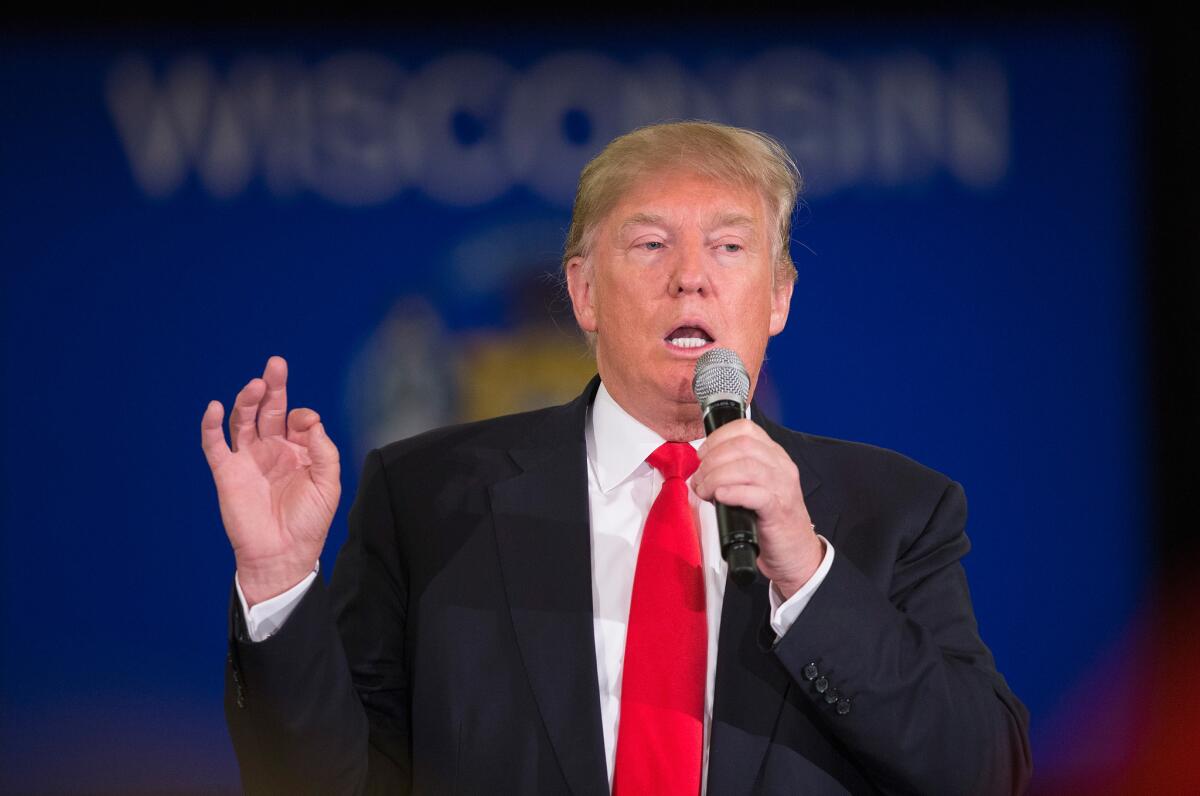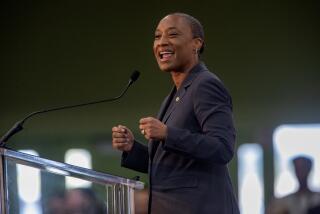Analysis: In abortion stumble, Donald Trump shows glaring election weaknesses

Donald Trump’s stumble over whether women seeking abortions should be criminally punished provided a sobering look at the vulnerability of a candidate more likely than anyone else to be the Republican nominee.
As Trump hastily issued a statement saying, in effect, that he didn’t believe what he had just said, his Republican challengers seized on his comments as proof that he lacked both the knowledge and conservative commitment to serve as president. Democrats cited his remarks as evidence that he and the rest of the Republican field have skittered too far to the right on an issue on which Americans are decidedly centrist.
Candidate Trump’s stock in trade has been blustery confidence. The dust-up over abortion offered a bracing reminder of what can happen when that attitude mixes with Trump’s lack of experience — including on issues of huge importance to the Republican base. And it came at a time when Trump was trying to steady his campaign after controversies over his criticism of Ted Cruz’s wife and his campaign manager’s legal problems.
Election 2016 | Live coverage on Trail Guide | Track the delegate race | Sign up for the newsletter
That all of the issues dealt in some way with women made the developments more perilous politically and, perhaps, more revealing of an element of Trump’s character.
In presidential campaigns, abortion is often an issue of extreme importance to each party’s most reliable voters, but not to the bulk of those voting. That has meant that candidates follow party ideology to win the nomination, but the issue takes a distant back seat in the general election to more widely shared concerns, like the economy or national security.
That may not be the case this year. The percentage of people who see abortion rights as a threshold issue for determining their presidential pick has risen, polls suggest. Battles are being waged in many states where Republican legislatures have passed measures that severely limit the availability of abortion despite its constitutional standing.
Most recently, the death of Supreme Court Justice Antonin Scalia—and the possibility that the next president will determine the balance of the court—has put abortion rights squarely into the campaign mix.
Barely an event occurs without Republican and Democratic candidates citing the court opening as a prime reason to vote and abortion as one of the key reasons why.
That has left Republican candidates in an uncomfortable place: They and their party advocate a conservative position demanded by antiabortion activists but opposed by the broader group of voters candidates need to attract to win a general election.
Trump’s most recent difficulties began during a town hall Wednesday evening, when MSNBC anchor Chris Matthews asked the New York businessman about abortion. Trump repeated his current, fairly recently acquired, position--that he opposes abortion with the traditional exceptions for victims of rape or incest or in cases when the life of the mother is endangered.
Matthews pressed further, asking whether a woman should be “punished” for having an abortion if, as Trump desires, it becomes illegal. After a back and forth, Trump said that “the answer is that there has to be some form of punishment.”
“For the woman?” Matthews asked.
“Yes, there has to be some form,” Trump replied, adding that he did not know what the punishment should be.
For Trump the logic may have been obvious: If abortion is made a crime, there should be criminal penalties. But his answer upended what has been a near-unanimous posture by abortion opponents that a woman should not be held criminally responsible.
Trump may not have known that, since he has not been steeped in the abortion wars like the politicians he’s running against. When he considered a run for president in 2000, he described himself in a television interview as “very pro-choice.” The clip was included this year in an ad by Cruz, the Texas senator who is one of the two remaining Trump challengers. Trump says he now opposes abortion, but has never said when he changed his mind.
Trump didn’t help himself with two other comments on MSNBC: He absolved fathers from any criminal punishment, even if a party to abortion. And he casually referred to what he saw as the outcome of his desired ban:
“You know, you will go back to a position like they had, where people will perhaps go to illegal places.”
The immediate impact on Trump’s supporters is likely nil; their support for him has outlasted controversies that would have doomed any other political figure. His impolitic statements are taken by Trump loyalists—and even by some Republicans who have doubts about him—as evidence of genuineness, candor and a welcome refusal to abide political correctness.
But the Republican race is now in a fraught period: Without consistent victories in the remaining states, Trump risks heading to the July national convention without the 1,237 delegates needed to ensure his nomination.
To defeat Trump, his opponents, Cruz and Ohio Gov. John Kasich, aren’t counting on his voters to abandon him. Instead, they hope waffling Republicans in upcoming primary states—and, later, convention delegates—will decide they cannot stomach the former reality television star as the party’s nominee.
Their pile of ammunition has grown in the last week, with the feud over Trump’s and Cruz’s wives and the Trump campaign manager’s misdemeanor charges for allegedly grabbing the arm of a female reporter. That may have accounted for the speed with which Trump offered a rare and hasty reversal on his abortion comments.
Soon after the remarks aired, he issued a statement that effectively changed his position without mentioning his previous remarks.
“The doctor or any other person performing this illegal act upon a woman would be held legally responsible, not the woman,” the new statement said, in setting out Trump’s view of what should happen. “The woman is a victim in this case as is the life in her womb. My position has not changed -- like Ronald Reagan, I am pro-life with exceptions.”
Kasich impugned Trump’s abortion stance and Cruz went further, calling attention to Trump’s unfamiliarity with many issues.
“Once again Donald Trump has demonstrated that he hasn’t seriously thought through the issues, and he’ll say anything just to get attention,” Cruz said.
While Democratic candidate Bernie Sanders called Trump’s comments “shameful,” the party front runner Hillary Clinton used the issue more broadly: setting up a general election contrast by reminding voters that the entire GOP field has moved to the right.
“Now they aren’t quite as open about it as Donald Trump was earlier today, but they all have the same position,” Clinton said of the Republicans in a CNN interview. “If you make abortion a crime -- you make it illegal -- then you make women and doctors criminals.”
Views among Americans on abortion have been remarkably stable, although highly partisan. A September 2015 Pew survey found 51% of Americans backed abortion rights, to 43% opposed. But among older and more conservative voters, target groups for the three GOP candidates, opposition to abortion has risen.
What has changed most is the emphasis voters give the issue. A Gallup survey last year found a record percentage of Americans would only vote for a candidate with similar views on abortion rights—and abortion-rights supporters in that group now equaled those opposing abortion.
Of all of the GOP candidates, Trump, at least until Wednesday, may have had the most moderate position on abortion. Cruz has opposed abortion even in cases of rape or incest and sought to shut down the government over money for Planned Parenthood. Kasich favors exceptions in the case of rape, incest or the life of the mother, but has worked as governor to close down abortion providers and signed a measure de-funding Planned Parenthood in Ohio.
Trump has brought up the subject of abortion mostly when asked about it. He has repeatedly praised Planned Parenthood for its work on women’s health—fighting words to many Republicans.
More than anything, Trump has given the sense that the issue doesn’t rise high on his list of concerns. His campaign thrusts are jobs, trade and illegal immigration; when he feels the need to protect his right flank, he most often does it by citing his opposition to gun control.
But there’s a difference between putting an issue low on a list and not thinking through a position enough to weather questioning. By failing to do that, Trump not only illuminated his lack of reflection on abortion. Just as dangerously, he may have amplified questions from many voters about whether he lacks something else: the seriousness to claim the job he wants.
Follow me on Twitter: @cathleendecker. For more on politics, go to latimes.com/decker.
ALSO:
Bitter GOP divisions are like nothing the party has seen before
California’s June primary just became crucial in the race for the White House
Live coverage from the campaign trail
Updates on California politics
More to Read
Get the L.A. Times Politics newsletter
Deeply reported insights into legislation, politics and policy from Sacramento, Washington and beyond. In your inbox three times per week.
You may occasionally receive promotional content from the Los Angeles Times.











